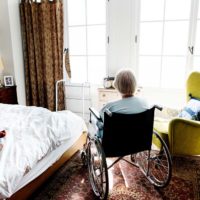Protecting Your House After You Move into a Nursing Home

When people start thinking about aging and the looming potential for needing long-term nursing care that comes along with it, one of the primary questions people have is: can a nursing home take your house?
While you generally do not have to sell your home in order to qualify for Medicaid for nursing home coverage, it’s possible for the state to file a lien against your home after you die, so you may want to take steps to protect your house.
Can a Nursing Home Take Your House?
If you get help from Medicaid to pay for the nursing home, the state must attempt to recoup from your estate whatever benefits it paid for your care. This is called estate recovery, and given the rules for Medicaid eligibility, the only property of substantial value that a Medicaid recipient is likely to own at death is their home. If possible, you should consult with McDonald Law Firm before entering a nursing home, or as soon as possible afterward, to discuss ways to protect your home.
The home is not counted as an asset for Medicaid eligibility purposes if the equity is less than $688,000 in most states ($1,033,000 in some states) in 2023. In all states, you may keep your house with no equity limit if your spouse or another dependent relative lives there.
Transferring a Home to Your Children
In most states (including Maryland and the District of Columbia), transferring your house to your children (or someone else) may lead to a Medicaid penalty period, which would make you ineligible for Medicaid for a period of time. There are circumstances in which it is permissible to transfer a house without incurring a transfer penalty. So consult an attorney before making any transfers. You may freely transfer your home to the following individuals without incurring a transfer penalty:
- Your spouse
- A child who is under age 21 or who is blind or disabled
- Into a trust for the sole benefit of a disabled individual under age 65 (even if the trust is for the benefit of the Medicaid applicant, under certain circumstances)
- A sibling who has lived in the home during the year preceding the applicant’s institutionalization and who already holds an equity interest in the home
- A caretaker child of the applicant who lived in the house for at least two years prior to the applicant’s institutionalization and who, during that period, provided care that allowed the applicant to avoid a nursing home stay
While you can sell your house for fair market value, it may make you ineligible for Medicaid, and you may have to apply the proceeds of the sale to your nursing home bills.
Medicaid Liens for Estate Recovery
Except in certain circumstances, Medicaid may put a lien on your house for the amount of money spent on your care. If the property is sold while you are still living, you would have to satisfy the lien by paying back the state. The exceptions to this rule are cases where a spouse, a disabled or blind child, a child under age 21, or a sibling with an equity interest in the house is living there.
If your spouse, a disabled or blind child, a child under age 21, or a sibling with an equity interest in the house lives in your home, the state can’t file a lien for reimbursement of Medicaid nursing home expenses. However, once your spouse or dependent relative dies or moves out, the state can try to collect. Again, this is known as estate recovery.
Tenancy by the Entirety
But there are some circumstances under which the value of a house can be protected from Medicaid recovery. The state can’t recover if you and your spouse owned the home as tenants by entirety or if the house is in your spouse’s name and you have relinquished your interest. If the house is in an irrevocable trust, the state can’t recover from it.
Undue Hardship
In addition, some children or relatives may be able to protect a nursing home resident’s house if they qualify for an undue hardship waiver. For example, if your daughter took care of you before you entered the nursing home and has no other permanent residence, she may be able to avoid a claim against your house after you die. Consult with an attorney to find out if the undue hardship waiver may be applicable.
To learn more about your options, find a qualified attorney nearby to assist you.
If you have questions regarding the content of this blog or you would like to learn more about getting started with an estate plan that is right for you, give Andre O. McDonald, a knowledgeable Howard County estate planning, special-needs planning, veterans pension planning and Medicaid planning attorney a call, today, at (443) 741-1088, to schedule a consultation.
DISCLAIMER: THE INFORMATION POSTED ON THIS BLOG IS INTENDED FOR EDUCATIONAL PURPOSES ONLY AND IS NOT ENTENDED TO CONVEY LEGAL OR TAX ADVICE.











